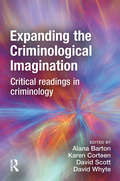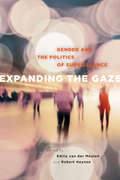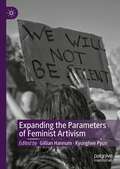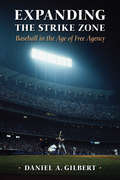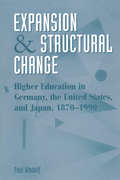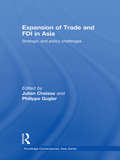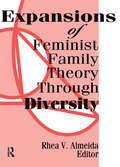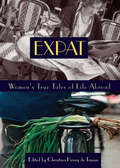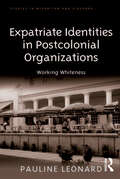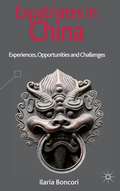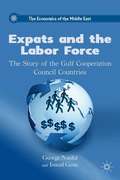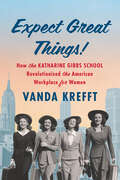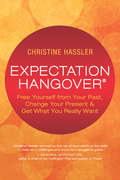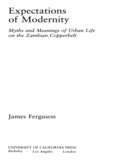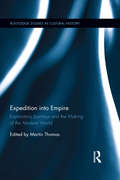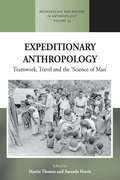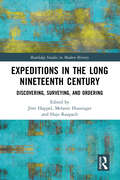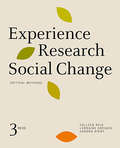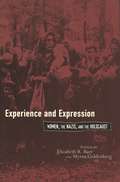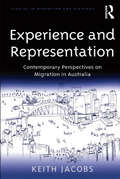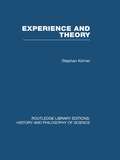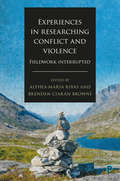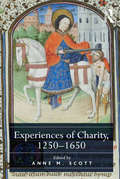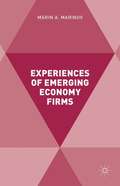- Table View
- List View
Expanding the Criminological Imagination
by David Scott Alana Barton Karen Corteen Dave WhyteThis book brings together a series of writings on the problems facing contemporary criminology, highlighting the main theoretical priorities of critical analysis and their application to substantive case studies of research in action. Its main aim is to establish the conceptual and practical foundations for a new generation of studies in criminology, and to set a new agenda for critical criminology. Each chapter will critically assess the main conceptual and empirical problems they have encountered in their research, and to bring to life the key theoretical debates within the discipline. This book will be essential reading for students seeking an understanding of the nature of the discipline of criminology and criminological research.
Expanding the Gaze: Gender and the Politics of Surveillance
by Emily van der Meulen Robert HeynenFrom sexualized selfies and hidden camera documentaries to the bouncers monitoring patrons at Australian nightclubs, the ubiquity of contemporary surveillance goes far beyond the National Security Agency's bulk data collection or the proliferation of security cameras on every corner.Expanding the Gaze is a collection of important new empirical and theoretical works that demonstrate the significance of the gendered dynamics of surveillance. Bringing together contributors from criminology, sociology, communication studies, and women's studies, the eleven essays in the volume suggest that we cannot properly understand the implications of the rapid expansion of surveillance practices today without paying close attention to its gendered nature. Together, they constitute a timely interdisciplinary contribution to the development of feminist surveillance studies.
Expanding the Palace of Torah: Orthodoxy and Feminism
by Tamar Ross"Expanding the Palace of Torah offers a broad philosophical overview of the challenges the women's revolution poses to Orthodox Judaism, and Orthodox Judiasm's response to those challenges. Writing as an insider (herself an Orthodox Jew), Ross seeks to develop a theological response that fully acknowledges the male bias of Judaism's sanctified texts, yet nevertheless provides a rational for transforming that bias in today's world without undermining their authority. She proposes an approach to divine revelation-- the theological heart of traditional Judaism-- which she calls "cumulativism." This approach is based on a conflating of strict boundaries between text and its interpretation, or the divine intent and the evolution of human understanding." "Ross believes that the greater fluidity afforded by cumulativism is necessary for legitimizing the insights of feminism and fully absorbing women's changed status within the religious rubric of Jewish tradition. Emphasizing that continuity with tradition can be maintained only when the halakhic system is understood as a living organism that grows via affirmation of its historical legacy and respect for its constraints, her book shows that the feminist revolution in Orthodox Judaism reaches beyond its practical effect upon individual lives to teach us something more profound about the nature of religious practice in general." -- Amy Gottlieb Zorn berg (from the back cover)
Expanding the Parameters of Feminist Artivism
by Kyunghee Pyun Gillian HannumThis book explores the work and careers of women, trans, and third-gender artists engaged in political activism. While some artists negotiated their own political status in their indigenous communities, others responded to global issues of military dictatorship, racial discrimination, or masculine privilege in regions other than their own. Women, trans, and third-gender artists continue to highlight and challenge the disturbing legacies of colonialism, imperialism, capitalism, communism, and other political ideologies that are correlated with patriarchy, primogeniture, sexism, or misogyny. The book argues that solidarity among such artists remains valuable and empowering for those who still seek legitimate recognition in art schools, cultural institutions, and the history curriculum.
Expanding the Strike Zone: Baseball in the Age of Free Agency
by Daniel A. GilbertWith its iconic stars and gleaming ballparks, baseball has been one of the most captivating forms of modern popular culture. In Expanding the Strike Zone, Daniel A. Gilbert examines the history and meaning of the sport's tumultuous changes since the mid-twentieth century, amid Major League Baseball's growing global influence. From the rise of ballplayer unionism to the emergence of new forms of scouting, broadcasting, and stadium development, Gilbert shows that the baseball world has been home to struggles over work and territory that resonate far beyond the playing field. Readers encounter both legendary and unheralded figures in this sweeping history, which situates Major League Baseball as part of a larger culture industry. The book examines a labor history defined at once by the growing power of big league stars--from Juan Marichal and Curt Flood to Fernando Valenzuela and Ichiro Suzuki--and the collective struggles of players working to make a living throughout the baseball world. It also explores the territorial politics that have defined baseball's development as a form of transnational popular culture, from the impact of Dominican baseball academies to the organized campaign against stadium development by members of Seattle's Asian American community. Based on a rich body of research along with new readings of popular journalism, fiction, and film, Expanding the Strike Zone highlights the ways in which baseball's players, owners, writers, and fans have shaped and reshaped the sport as a central element of popular culture from the postwar boom to the Great Recession.
Expansion And Structural Change: Higher Education In Germany, The United States, And Japan, 1870-1990
by Paul WindolfAs a central institution that ensures equality of opportunity and social justice, the university is the most important channel of social mobility in modern societies. Over the past century, universities have assumed an important role in the political and cultural emancipation of women, minorities, and the lower socioeconomic classes. This expansion in educational institutions was not an isolated event in the years after the World War II, but rather a phase in a longer, secular process of modernization which started in the late nineteenth century and continues up to the present day.Expansion and Structural Change explores this development, focusing on the social background of students and the institutional transformation of higher education in several countries. Who have been the beneficiaries of this remarkable process of educational expansion? Has it made Western society more open, mobile, and democratic? These questions are analyzed from a historical perspective which takes into account the institutional change of universities during this century.Based on archival data for the United States, Germany, Japan, France, and Italy, this study combines both comparative and historical perspectives. It documents the political struggle of different social groups for access to univeristies, as well as the meritocratic selection for higher status positions. This work will be an indispensable reference for anyone searching for a comparative and historical analysis of higher education in the most advanced countries.
Expansion of Trade and FDI in Asia: Strategic and Policy Challenges (Routledge Contemporary Asia Series)
by Julien Chaisse Philippe GuglerForeign direct investment flows have increased dramatically in recent decades and continue to be a driving factor of economic globalisation. As a growth pole in the world economy, large parts of Asia have particularly become an attractive place for market-seeking FDI. In a high number of Asian countries FDI restrictions have been reduced, leading to accelerated technological exchange and globally integrated production and marketing networks. Overall, this has positively benefited the emerging countries that have opened their doors to FDI. Expansion of Trade and FDI in Asia explores the trends of present FDI in Asia and their effects on multilateral regulation of FDI. It reviews the increasing attraction of FDI and the rise of Asian transnational corporations (TNCs) from an economic perspective. It also investigates the legal side of the development, in particular the changes in bilateral and regional FDI regulation, and the lessons that could be learned for International Investment Agreements (IIAs) and the constitution of trading blocs. This book will be of interest to postgraduates and academics interested in Asian studies, Asian economics and international economics.
Expansions of Feminist Family Theory Through Diversity
by Rhea AlmeidaExpansions of Feminist Family Theory Through Diversity reconstructs feminist family therapy to include issues of race, class, gender, culture, and sexual orientation. The contributors assist you with creating possible solutions to mental health problems in all types of families. This will enable you to find specific working strategies to help solve the problems inherent in families of diversity. This book also provides you with several conceptual models for approaching the sociopolitical context of family therapy.This collection challenges family therapy as an existing context of power privilege and expands feminist principle and diversity into subject areas such as intimate violence among the racially and sexually different, heterosexual privilege in family life, homosexual and racial oppression, social inequalities within the therapeutic story, and, from Monica McGoldrick, reflections on self as viewed by the multiple social systems of oppression.Clinicians and practicing feminist therapists can find insight into many general topic areas relevant to daily practice, such as: race as a social construct culture in the context of race, class, gender, and sexual orientation assessment and treatment of violence in heterosexual and homosexual families a social critique of therapeutic inequalities addressing the social inequalities in the delivery of mental health the politics of privilege and privacy in family lifeExpansions of Feminist Family Theory Through Diversity is organized in a way that makes it central to all clinical practice. It can be used as a guidebook for family therapists, social workers, counselors (guidance, clergy, and counseling programs) and psychologists who deal with diverse families and their problems.
Expat: Women's True Tales of Life Abroad (Adventura Books)
by Christina Henry de TessanIt's one thing to travel abroad--to stay in charming hotels and deliberate over whether to visit this museum or relax at that café, even to head off the beaten track for a glimpse of "real" life--and another thing altogether to move to another country. Expat chronicles the experiences of twenty-two ordinary women living extraordinary lives in outposts as far flung as Borneo, Ukraine, India, Greece, Brazil, China and the Czech Republic. In vivid detail, these writers share how the realities of life abroad match up to the expat fantasy. One woman negotiates the rough courtesies of Serbia, finding lives limned by harshness and an insurmountable spirit. Another is tutored on English manners by an eclectic bunch from Liverpool: "The cardinal sin in America is to be insincere, whereas the cardinal sin in England is to be boring." For some, their new home prompts them to reconnect or confront lost parts of themselves: One woman rediscovers her Judaism--in Japan; another writer's Western outlook is challenged by Javanese mysticism. Many share their own naïve blunders and private confessions: a Thanksgiving dinner that doesn't translate in Paris, a sudden yearning for bad Hollywood films. And all discover that what it means to be "American" is redefined, again and again. Expat taps into the bewilderment, the joys and surprises of life overseas, where the challenges often take unexpected forms and the obstacles overcome are all the more triumphant. Featuring an astonishing range of perspectives, destinations and circumstances, this collection offers a beautiful portrait of expatriate life.
Expatriate Identities in Postcolonial Organizations: Working Whiteness (Studies in Migration and Diaspora)
by Pauline LeonardExpatriate Identities in Postcolonial Organizations offers a timely and contemporary discussion of the role of organizations in maintaining or challenging structures and cultures based on racism and discrimination. It offers a key exploration of the relations between whiteness, identity and organization in migratory contexts. It delves into the experiences of expatriates in Hong Kong and the ways in which new identities are constructed in the destinations of migration by exploring the renegotiation of white identities and racialized relationships, and the extent to which colonial imaginations still inform contemporary organizations. By drawing on existing theoretical and empirical material on post-colonialism, identity-making, privileged migration, relocation, transnational work and organizations, this volume brings disparate discussions together in a new and accessible way. It will appeal to a range of sociology scholars as well as to those working in the fields of migration, gender studies, and cultural geography.
Expatriates in China: Experiences, Opportunities and Challenges
by Ilaria BoncoriFocuses on the individual experiences of Western expatriates in China by merging academic knowledge and real-life testimonials given by interviewees. The author also draws on her own experience of living and working in China, to explore a range of challenges and opportunities met by Western expatriates.
Expats and The Labor Force
by George Naufal Ismail GencExpats and the Labor Force examines the flows of people and money in the Gulf Cooperation Council (GCC) countries. This timely book outlines the reasons that made the Gulf region a destination for millions of migrants. Taking advantage of the discovery of large hydrocarbon reserves and relatively stable political environment, the GCC countries filled the large demand for labor with foreign workers. However the number, share, and source of expatriates have presented serious challenges for the region. Naufal and Genc discuss these consequences on the composition of the labor force and remittance outflows.
Expect Great Things!: How the Katharine Gibbs School Revolutionized the American Workplace for Women
by Vanda KrefftA fun and fascinating social history of the famed Katharine Gibbs School, which from the 1910s to the 1960s, trained women for executive secretary positions but surreptitiously was instilling the self-confidence and strategic know-how necessary for them to claim equality, power, and authority in the wider world. It&’s a safe bet that most of the secretaries on the TV series Mad Men would have attended the Katharine Gibbs School in New York City. The iconic institution was in its heyday in the 1950 and '60s synonymous with supplying secretaries—always properly attired in heels, ladylike hats, and white gloves—to male executives. In Expect Great Things! Vanda Krefft turns the notion of a &“Gibbs girl&” on its head, showing us that while the school was getting women who could type 90 words per minute into the C-suite, its more subversive mission was to get them out of the secretarial pool to assume positions of power on the other side of the desk. And Gibbs graduates did just that, tackling the sexism of the era and paving the way for 21st-century women to succeed in any profession. Katharine Gibbs was one her own success stories. She started her school when, as a 46-year-old widow, she was left near-broke with two young sons. The school taught typing and stenography but Gibbs also hired accomplished professors from elite colleges to teach academic subjects—it was a well-rounded education that produced early feminists ready to tackle the sexism of their era. "Expect great things!" was her motto and her philosophy. Within a decade she&’d opened schools in three elegant locations. With nostalgic period photographs throughout, Expect Great Things! takes us back to Katie Gibbs&’s life and tells the stories of the women she influenced. We meet Gibbs graduates who worked for the Walt Disney, Marilyn Monroe, and Robert F. Kennedy. Others forged pathfinding roles as an Emmy-winning television star, a women&’s rights advisor to four U.S. presidents, a writer of Wonder Woman comic books, the head of the Women&’s Marines, a best-selling young adult author, and a U.S. Ambassador. For readers of The Barbizon and Come Fly the World, Expect Great Things! reveals the seismic impact the Katharine Gibbs school had on the American workplace—and on women&’s opportunities today.
Expectation Hangover: Free Yourself from Your Past, Change Your Present and Get What You Really Want
by Christine HasslerWhen our expectations are met and things go according to plan, we feel a sense of accomplishment; we feel safe, in control, and on track. But when life does not live up to our expectations, we end up with an Expectation Hangover. This particular brand of disappointment is profoundly uncomfortable and can cost us valuable time and energy if not treated and leveraged effectively. Christine Hassler has broken down the complex and overwhelming experience of recovering from disappointment into a step-by-step treatment plan. This book reveals the formula for how to process Expectation Hangovers on the emotional, mental, physical, and spiritual levels to immediately ease suffering. Instead of wallowing in regret, self-recrimination, or anger, we can see these experiences as catalysts for profound transformation and doorways that open to possibility. Often it is only when life throws us a curveball (or several) that we look in a different direction and make room for the kinds of unexpected things that lead more directly to a life we love. By the time you finish this book, you’ll understand why your Expectation Hangover happened and have your own treatment plan — a clear course of action to pursue your goals while preventing future disappointment.
Expectations of Modernity
by James FergusonOnce lauded as the wave of the African future, Zambia's economic boom in the 1960s and early 1970s was fueled by the export of copper and other primary materials. Since the mid-1970s, however, the urban economy has rapidly deteriorated, leaving workers scrambling to get by. Expectations of Modernity explores the social and cultural responses to this prolonged period of sharp economic decline. Focusing on the experiences of mineworkers in the Copperbelt region, James Ferguson traces the failure of standard narratives of urbanization and social change to make sense of the Copperbelt's recent history. He instead develops alternative analytic tools appropriate for an "ethnography of decline." Ferguson shows how the Zambian copper workers understand their own experience of social, cultural, and economic "advance" and "decline." Ferguson's ethnographic study transports us into their lives--the dynamics of their relations with family and friends, as well as copper companies and government agencies. Theoretically sophisticated and vividly written, Expectations of Modernity will appeal not only to those interested in Africa today, but to anyone contemplating the illusory successes of today's globalizing economy.
Expedition into Empire: Exploratory Journeys and the Making of the Modern World (Routledge Studies in Cultural History #31)
by Martin ThomasExpeditionary journeys have shaped our world, but the expedition as a cultural form is rarely scrutinized. This book is the first major investigation of the conventions and social practices embedded in team-based exploration. In probing the politics of expedition making, this volume is itself a pioneering journey through the cultures of empire. With contributions from established and emerging scholars, Expedition into Empire plots the rise and transformation of expeditionary journeys from the eighteenth century until the present. Conceived as a series of spotlights on imperial travel and colonial expansion, it roves widely: from the metropolitan centers to the ends of the earth. This collection is both rigorous and accessible, containing lively case studies from writers long immersed in exploration, travel literature, and the dynamics of cross-cultural encounter.
Expeditionary Anthropology: Teamwork, Travel and the ''Science of Man'' (Methodology & History in Anthropology #33)
by Martin Thomas Amanda HarrisThe origins of anthropology lie in expeditionary journeys. But since the rise of immersive fieldwork, usually by a sole investigator, the older tradition of team-based social research has been largely eclipsed. Expeditionary Anthropology argues that expeditions have much to tell us about anthropologists and the people they studied. The book charts the diversity of anthropological expeditions and analyzes the often passionate arguments they provoked. Drawing on recent developments in gender studies, indigenous studies, and the history of science, the book argues that even today, the ‘science of man’ is deeply inscribed by its connections with expeditionary travel.
Expeditions in the Long Nineteenth Century: Discovering, Surveying, and Ordering (Routledge Studies in Modern History)
by Jörn Happel Melanie Hussinger Hajo RaupachThis book examines the processes of scientific, cultural, political, technical, colonial and violent appropriation during the 19th century. The 19th century was the century of world travel. The earth was explored, surveyed, described, illustrated, and categorized. Travelogues became world bestsellers. Modern technology accompanied the travelers and adventurers: clocks, a postal and telegraph system, surveying equipment, and cameras. The world grew together faster and faster. Previously unknown places became better known: the highest peaks, the coldest spots, the hottest deserts, and the most remote cities. Knowledge about the white spots of the earth was systematically collected. Those who made a name for themselves in the 19th century are still read today. Alexander von Humboldt or Charles Darwin made the epoch a scientific heyday. Ida Pfeiffer or Isabelle Bird (Bishop) traveled to distant continents and took their readers at home on insightful journeys. Hermann Vámbéry or Sir Richard Burton got to know the most remote languages and regions. There are countless travel reports about a fascinating century, which, with surveying and exploration, also brought colonial conquest and exploitation into the world. In ten individual studies, the authors explore travelers from all over the world and analyze their successes. The unifying element of all the studies is the experience of distance and its communication by means of travelogues to the armchair travelers who have stayed at home.This volume will be of value to students and scholars both interested in modern history, social and cultural history, and the history of science and technology.
Experience Research Social Change: Critical Methods, Third Edition
by Colleen Reid Lorraine Greaves Sandra KirbyExperience Research Social Change is a “how to” guide to research that also raises broader theoretical, methodological, and ethical questions. First published in 1989, it was the first critical methods book, and continues to inspire generations of researchers, students, and community workers. The third edition has been thoroughly revised, now containing twelve chapters organized into three parts: experience, research, and social change. The new edition also includes a wider range of examples from diverse researchers and topics that are woven throughout the text, including transdisciplinary research, sex and gender analysis, intersectional analysis, Indigenous methodologies, community-based research, digital and online approaches to research, ethical responsibilities and commitments, and knowledge translation.
Experience and Expression: Women, the Nazis, and the Holocaust
by Elizabeth R. Baer Myrna GoldenbergThe many powerful accounts of the Holocaust have given rise to women's voices, and yet few researchers have analyzed these perspectives to learn what the horrifying events meant for women in particular and how they related to them. In Experience and Expression, the authors take on this challenge, providing the first book-length gendered analysis of women and the Holocaust, a topic that is emerging as a new field of inquiry in its own right. Accessible to readers on many levels, the essays portray the experiences of women of various religious and ethnic backgrounds, and draw from the fields of English, religion, nursing, history, law, comparative literature, philosophy, French, and German. The collection explores an array of fascinating topics: rescue and resistance, the treatment of Roma and Sinti women, the fate of female forced laborers, Holocaust politics, nurses at so-called euthanasia centers, women's experiences of food and hunger in the camps, the uses and abuses of Anne Frank, and the representations of the Holocaust in art, film, and literature in the postwar era. The introduction provides a thorough overview of the current status of research in the field, and each essay seeks to push the theoretical boundaries that shape our understanding of women's experience and agency during the Holocaust and of the ways in which they have expressed their memories.
Experience and Representation: Contemporary Perspectives on Migration in Australia (Studies in Migration and Diaspora)
by Keith JacobsExperience and Representation: Contemporary Perspectives on Migration in Australia provides a critical overview of influential theoretical perspectives and recent empirical material in the fields of migration, race, culture and politics. With a primary focus on Australia, the book explores the complexities surrounding migration; sets out the most appropriate frameworks to understand ethnicity and racism; and assesses the utility of the concepts of globalisation, transnationalism and multiculturalism for interpreting contemporary society. Specific chapters explore the experiences of migrants within the context of urban environments; the vexed issue of national identity; the meaning of home; and the ways that migrants are currently represented in the media, literature and film. Experience and Representation will be of interest to scholars of migration and those studying social theory, politics and the media.
Experience and Theory: An Essay in the Philosophy of Science (Routledge Library Editions: History & Philosophy of Science)
by Stephan KornerOriginally published in 1966. This volume analyzes the general structure of scientific theories, their relation to experience and to non-scientific thought. Part One is concerned with the logic underlying empirical discourse before its subjection to the various constraints, imposed by the logico-mathematical framework of scientific theories upon their content. Part Two is devoted to an examination of this framework and, in particular, to showing that the deductive organization of a field of experience is by that very act a modification of empirical discourse and an idealization of its subject matter. Part Three analyzes the concordance between theories and experience and the relevance of science to moral and religious beliefs.
Experiences in Researching Conflict and Violence: Fieldwork Interrupted
by Althea-Maria Rivas and Brendan Ciarán BrowneThis international, edited collection brings together personal accounts from researchers working in and on conflict and explores the roles of emotion, violence, uncertainty, identity and positionality within the process of doing research, as well as the complexity of methodological choices. It highlights the researchers’ own subjectivity and presents a nuanced view of conflict research that goes beyond the ‘messiness’ inherent in the process of research in and on violence. It addresses the uncomfortable spaces of conflict research, the potential for violence of research itself and the need for deeper reflection on these issues. This powerful book opens up spaces for new conversations about the realities of conflict research. These critical self-reflections and honest accounts provide important insights for any scholar or practitioner working in similar environments.
Experiences of Charity, 1250-1650
by Anne M. ScottFor a number of years scholars who are concerned with issues of poverty and the poor have turned away from the study of charity and poor relief, in order to search for a view of the life of the poor from the point of view of the poor themselves. Great studies have been conducted using a variety of records, resulting in seminal works that have enriched our understanding of pauper experiences and the influence and impact of poverty on societies. If we return our gaze to ’charity’ with the benefit of those studies' questions, approaches, sources and findings, what might we see differently about how charity was experienced as a concept and in practice, at both community and personal levels? In this collection, contributors explore the experience of charity towards the poor, considering it in spiritual, intellectual, emotional, personal, social, cultural and material terms. The approach is a comparative one: across different time periods, nations, and faiths. Contributors pay particular attention to the way faith inflected charity in the different national environments of England and France, as Catholicism and Calvinism became outlawed and/or minority faith positions in these respective nations. They ask how different faith and beliefs defined or shaped the act of charity, and explore whether these changed over time even within one faith. The sources used to answer such questions go beyond the textual as contributors analyse a range of additional sources that include the visual, aural, and material.
Experiences of Emerging Economy Firms
by Marin MarinovExperiences of Emerging Economy Firms investigates the different elements of the experiences of emerging economy firms and sheds essential light on a large variety of aspects associated with their functioning in both home and host contexts. For example, firms must be able to overcome the liability of foreign and emerging issues when they expand their activities in various contexts, enter, exit and re-enter overseas markets; they have to overcome institutional barriers, adapt the cultural challenges in foreign markets, undergo the impact of large multinational firms from developed economies and experience the impact of home institutions and government policies. This groundbreaking and illuminating book presents issues of theoretical and practical significance, thus challenging existing paradigms of firm internationalization.
